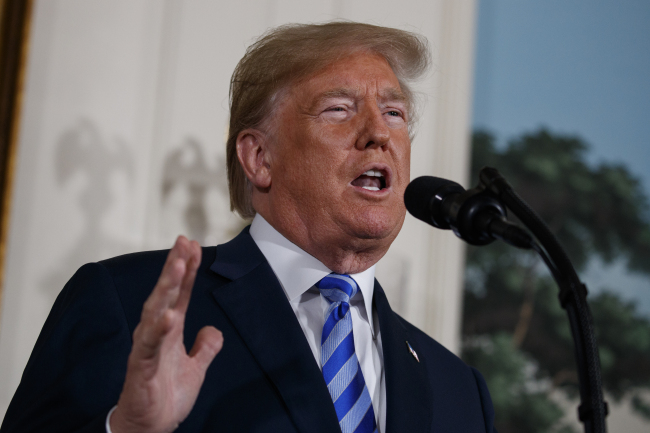Trump’s Iran deal pullout has little impact on US-NK nuclear talks: analysts
By Yeo Jun-sukPublished : May 9, 2018 - 16:34
With US President Donald Trump announcing his country’s withdrawal from the Iran nuclear deal, debates have emerged over how the move would impact future negotiations with the nuclear-armed North Korea.
Denouncing the nuclear pact with Iran as a “horrible, one-sided” deal, Trump stressed that the withdrawal would send a strong signal to North Korea, which, unlike Iran, boasts full-fledged nuclear capabilities with dozens of nuclear warheads for intercontinental ballistic missiles.
But Seoul-based security analysts asserted that the decision was designed more for Trump’s domestic audience than North Korea, downplaying the possibility that the withdrawal would dramatically change North Korea’s calculations over upcoming nuclear talks.
“It was not a secret to North Korea that Trump would eventually pull out of the Iran nuclear deal,” said James Kim, a research fellow with the American Politics and Policy Program at the Asan Institute for Policy Studies.
“It would have been game-changing news to North Korea if the Trump administration had announced the decision before Pyongyang decided to propose a summit with Trump. … Kim Jong-un knew what he was getting into.”

In January, when North Korea signaled rapprochement with South Korea and a break in the standoff with Washington, Trump delivered an ultimatum to the Iran deal. He warned that the US would walk away from the agreement unless “disastrous flaws” were fixed.
Analysts noted that behind the Trump’s decision to scrap the Iran deal -- and hold a summit with North Korea -- lies his attempt to contrast himself with his predecessor Barack Obama, who reached a nuclear-deal with Iran in 2015, but made little progress on North Korea’s nuclear program.
Since coming into office, Trump has withdrawn from the Paris climate agreement that the Obama administration helped broker, abandoned Obama’s signature Asia-Pacific trade deal, and pulled back from the historic rapprochement with Cuba.
“Trump wants to undo every legacy during the Obama administration,” said professor Kim Dong-yup, a North Korea expert at Kyungnam University’s Far East Institute. “And the effort will be accomplished by seeking nuclear talks with North Korea.”
Still, there are concerns in Washington that Trump’s decision to pull out of the Iran deal -- which even the US official said Teheran abided by -- would undermine US credibility during its negotiations with North Korea.
Tony Blinken, a former deputy secretary of state who helped negotiate the Iran deal in 2015, told the CNN that Trump’s decision would add to Pyongyang’s suspicion that Trump might not follow through on the agreement.
Pyongyang would use it as leverage during the negotiation, urging the US to come up with “irreversible” measures to ensure implementation of the agreement, said Shin Beom-chul, a senior fellow at the Asan Institute for Policy Studies.
“I don’t think Trump’s decision is enough for North Korea to break the mood for US-North Korea summit. But Pyongyang would demand Washington’s firm commitment to delivering promises, such as congressional ratification of the nuclear deal,” he said.
The previous 1994 Agreed Framework, signed during the Clinton administration, collapsed when George W. Bush took office -- not only because of North Korean provocations, but also due to the US failure to keep its promise to help North Korea develop nuclear energy for peaceful purposes.
Regardless of Trump’s calculations, analysts said at least one thing is certain about his message toward North Korea: Pyongyang needs to do much more than what Teheran did over its nuclear program.
North Korea’s nuclear capabilities are seen to be far advanced than those of Iran. Along with ICBM capable of reaching the US, North Korea is suspected of having a nuclear stockpile of as many as 60 warheads -- compared with none in Iran.
“I think Trump’s message is that the denuclearization talks with North Korea should be a much more comprehensive one than that with Iran and North Korea should take measures to deliver the expectation,” said Kim of the Asan Institute for Policy Studies.
Among those measures are transferring a portion of nuclear weapons to the international inspectors and granting them unfettered access to nuclear facilities scattered across North Korea, Kim said.
Inspections of North Korea’s nuclear program are expected to be conducted on a far larger scale than that of Iran, with most of the country’s nuclear and missile sites thought to be hidden underground or deep in the mountains.
South Korea’s presidential office Cheong Wa Dae said Kim Jong-un “understands” the need for the inspections, but doubts persist over the extent to which the reclusive regime will open up its secret facilities.
“Complete denuclearization can be a myth. The focus should be on how we can do it in a fast and verifiable manner to get rid of North Korea’s capability to produce nuclear material,” said Kim Dong-yup of Kyungnam University.
(jasoyeo@heraldcorp.com)



![[AtoZ into Korean mind] Humor in Korea: Navigating the line between what's funny and not](http://res.heraldm.com/phpwas/restmb_idxmake.php?idx=644&simg=/content/image/2024/04/22/20240422050642_0.jpg&u=)
![[Exclusive] Korean military set to ban iPhones over 'security' concerns](http://res.heraldm.com/phpwas/restmb_idxmake.php?idx=644&simg=/content/image/2024/04/23/20240423050599_0.jpg&u=20240423183955)



![[Graphic News] 77% of young Koreans still financially dependent](http://res.heraldm.com/phpwas/restmb_idxmake.php?idx=644&simg=/content/image/2024/04/22/20240422050762_0.gif&u=)
![[Herald Interview] Why Toss invited hackers to penetrate its system](http://res.heraldm.com/phpwas/restmb_idxmake.php?idx=644&simg=/content/image/2024/04/22/20240422050569_0.jpg&u=20240422150649)





![[Exclusive] Korean military to ban iPhones over security issues](http://res.heraldm.com/phpwas/restmb_idxmake.php?idx=652&simg=/content/image/2024/04/23/20240423050599_0.jpg&u=20240423183955)



![[Today’s K-pop] Ateez confirms US tour details](http://res.heraldm.com/phpwas/restmb_idxmake.php?idx=642&simg=/content/image/2024/04/23/20240423050700_0.jpg&u=)